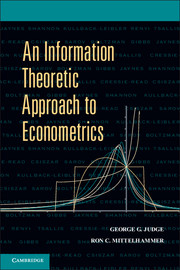Book contents
- Frontmatter
- Contents
- Preface
- One Econometric Information Recovery
- Part I Traditional Parametric and Semiparametric Econometric Models: Estimation and Inference
- Part II Formulation and Solution of Stochastic Inverse Problems
- Part III A Family of Minimum Discrepancy Estimators
- Seven The Cressie-Read Family of Divergence Measures and Empirical Maximum Likelihood Functions
- Eight Cressie-Read-MPD-Type Estimators in Practice
- Part IV Binary–Discrete Choice Minimum Power Divergence (MPD) Measures
- Part V Optimal Convex Divergence
- Abbreviations
- Index
- References
Eight - Cressie-Read-MPD-Type Estimators in Practice
Monte Carlo Evidence of Estimation and Inference Sampling Performance
from Part III - A Family of Minimum Discrepancy Estimators
Published online by Cambridge University Press: 05 June 2012
- Frontmatter
- Contents
- Preface
- One Econometric Information Recovery
- Part I Traditional Parametric and Semiparametric Econometric Models: Estimation and Inference
- Part II Formulation and Solution of Stochastic Inverse Problems
- Part III A Family of Minimum Discrepancy Estimators
- Seven The Cressie-Read Family of Divergence Measures and Empirical Maximum Likelihood Functions
- Eight Cressie-Read-MPD-Type Estimators in Practice
- Part IV Binary–Discrete Choice Minimum Power Divergence (MPD) Measures
- Part V Optimal Convex Divergence
- Abbreviations
- Index
- References
Summary
Introduction
We began developing the concept of empirical likelihood in Chapter 4, and we introduced a number of explicit formulations of minimum power divergence (MPD)-type estimators and inference procedures in Chapter 7 that can be applied to an array of econometric models used in empirical practice. These procedures dealt with data sampling processes that were of the linear model variety and encompassed the problem of structural equation modeling, whereby one or more right-hand-side explanatory variables were nonorthogonal to the noise term of the model. The procedures were thus applicable to the general linear model context, as well as to simultaneous equations models and other models that contain right-hand-side endogenous variables. Before proceeding to other data sampling processes that can be addressed using MPD-type methods, we devote this chapter to illustrate empirical implementation and performance characteristics of these MPD-type estimation and inference procedures, using a data sampling context that emulates problems encountered in applied econometric analysis.
The finite sample properties of the MPD-type estimators and associated inference procedures delineated in Chapter 7 cannot be derived from a direct evaluation of closed functional forms applied to distributions of random variables. This is similar to the case of finite sample probability distributions of traditional two-stage least squares (2SLS) and generalized method of moments (GMM) estimators, which are also generally intractable in closed form. Consequently, we use Monte Carlo (MC) sampling experiments to examine and compare the finite sample performance of competing estimators and inference methods. Although these results are specific to the collection of particular MC experiments analyzed, the wide-ranging reported sampling evidence provides an indication of the types of relative performance that can occur over a range of scenarios for which the unknown parameters of a model are moderately well identified.
- Type
- Chapter
- Information
- An Information Theoretic Approach to Econometrics , pp. 153 - 166Publisher: Cambridge University PressPrint publication year: 2011



